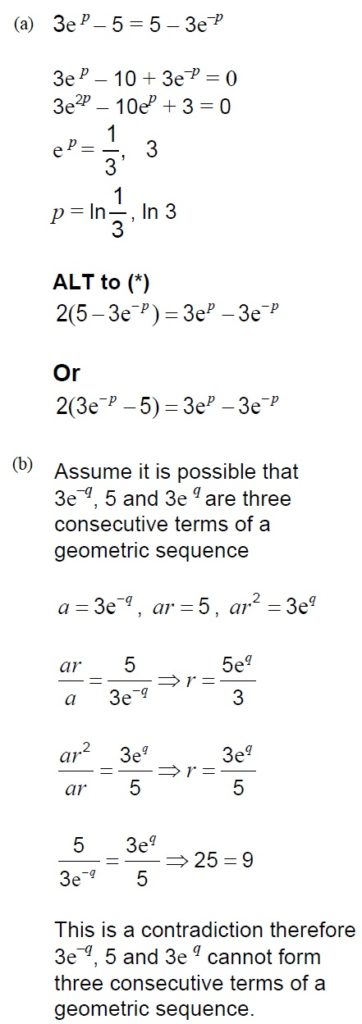Sequence and Series – Practice Questions
Q1. Suppose are the roots of and are the roots of .
(a) if are in arithmetic sequence, then find the common difference of this arithmetic sequence in terms of ,
(b) if are in geometric sequence, then find the common ratio of this geometric sequence in terms of .
Q2. If the third term of a geometric sequence is 3 , then find the product of the first 5 terms?
Q3. The sum of an infinite geometric series with first term is equal to 3. Show that .
Q4. Find the coefficient of in the polynomial .
Q5. If are the sum of infinite geometric series whose first terms are and whose common ratios are
respectively then find the value of .
Q6. Find
in terms of
if![]() are in arithmetic sequence.
are in arithmetic sequence.
Q7. Find the value of if are in arithmetic sequence.
Q8. Find the sum to terms of the series:
Q9. are in arithmetic sequence. If
are in geometric sequence, show that .
Q10. Two arithmetic sequences have the sum of their
terms in the ratio . Find the ratio of their 23rd terms.
Q11. Show that the sum to terms of the series is .
Q12. If , then find the value of .
Q13. Find the values of and if
where .
Q14. If and are the and terms respectively of an arithmetic sequence and also a geometric sequence, then show that the value of is equal to 1.
Q15. If are respectively the of a geometric sequence, then show that the value of is equal to zero.
Q16. (a) A geometric progression has a second term of 12 and a sum to infinity of 54. Find the possible values of the first term of the progression. [4 marks]
(b) The
th term of a progression is
, where
and
are constants, and
is the sum of the first
terms.
(i) Find an expression, in terms of
and
, for
. [3 marks]
(ii) Given that and , find the values of and . [2 marks]
Q17. A sequence is defined by
where
is a positive constant.
(a) Write down expressions for
and
in terms of
, giving your answers in their simplest form. (3 marks)
Given that
(b) find an exact value for
. (3 marks)
Q18. A company, which is making 140 bicycles each week, plans to increase its production.
The number of bicycles produced is to be increased by d each week, starting from 140 in week 1, to 140 + d in week 2, to 140 + 2d in week 3 and so on, until the company is producing 206 in week 12.
(a) Find the value of d. (2 marks)
After week 12 the company plans to continue making 206 bicycles each week.
(b) Find the total number of bicycles that would be made in the first 52 weeks starting from and including week 1. (5 marks)
Q19. The first three terms of a geometric sequence are
where
is a constant.
(a) Show that
(4 marks)
Given that
is not an integer,
(b) show that
(2 marks)
For this value of
,
(c) (i) evaluate the fourth term of the sequence, giving your answer as an exact fraction,
(ii) evaluate the sum of the first ten terms of the sequence. (6 marks)
Q20. A sequence
is defined by
,
.
The sum of the first
terms of this sequence is denoted by
. The terms of a second sequence
form a geometric progression with first term 1.2 and common ratio 1.2.
(i) Show that
. [2 marks]
(ii) Show that
. [3 marks]
(iii) Find the largest value of
such that
. [3 marks]
(iv) Find the largest value of
such that
. [4 marks]
Q21. The first three terms of a sequence are given by
(a) When
, show that the first three terms form the start of a geometric sequence, and state the value of the common ratio.
(b) Given that the entire sequence is geometric for
(i) state why the associated series has a sum to infinity
(ii) calculate this sum to infinity.
(c) There is a second value for
that also gives a geometric sequence.
For this second sequence
(i) show that
(ii) find the first three terms
(iii) state the value of
and justify your answer.
22. A geometric sequence has first term 80 and common ratio
.
(a) For this sequence, calculate:
(i) the
term; [2 marks]
(ii) the sum to infinity of the associated geometric series. [2 marks]
The first term of this geometric sequence is equal to the first term of an arithmetic sequence.
The sum of the first five terms of this arithmetic sequence is 240.
(b) (i) Find the common difference of this sequence. [2 marks]
(ii) Write down and simplify an expression for the nth term. [1 mark]
Let
represent the sum of the first
terms of this arithmetic sequence.
(c) Find the values of
for which
. [3 marks]
23. (a) Three consecutive terms in an arithmetic sequence are . Find the possible values of . Give your answers in an exact form.
(b) Prove that there is no possible value of q for which are consecutive terms of a geometric sequence.





